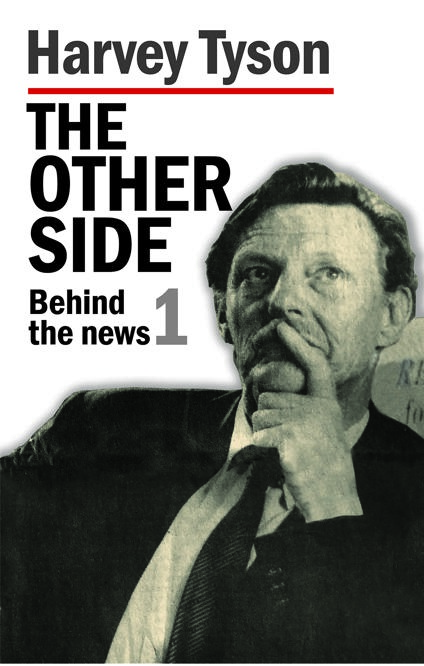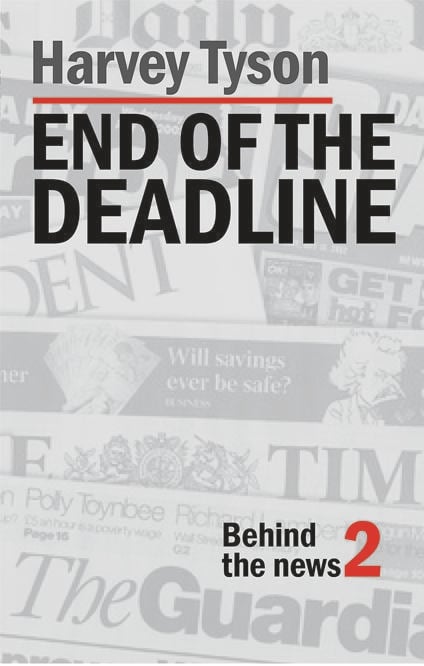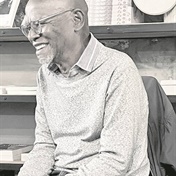
Before he died last week, Harvey Tyson published a two-part autobiography that traced his stellar career as a journalist and an editor. In this extract from The Other Side – Behind the news 1, he writes about his early reporting career.
Published by Print Matters Heritage
Price: R299
Pages: 408
Back in the late 1940s, when I arrived on the Pretoria News as a junior reporter still in my teens, I found things very different from the dear old Diamond Fields Advertiser with its ancient flatbed press that slowly clicked out copies of the newspaper before dawn, with a sedate, Victorian sense of pace and propriety.
By contrast, the all-male mainly ex-servicemen’s Pretoria News newsroom in its brand-new post-war building, with a brand-new rotary press, had a marvellously charged atmosphere … taut with the kind of frenetic energy to be found only on afternoon newspapers with “instant deadlines” at the height of the day.
The descriptions for that newsroom which spring to mind are: Smokestacked. Edgy. Uncomprehendingly noisy. The men back from war in Europe were tired of taking orders.
I remember veteran reporter Gerhi Strauss being an hour late for work each day for a week. At first, he blamed his “overload of investigative night work”. By the end of the week, he was blaming the red robots.
“But you walk to work,” the news editor reminded him in amazement.
“Ja … but now the traffic police have stopped us jaywalking,” he said.
“You spent an hour waiting for robots?”
Gerhi shrugged, so we merely glanced at the diary and went back to our desks.
Every newsroom in the world has a diary, in one form or another. That’s what makes a newsroom work. In the “old days” the diary – as big as a Dickensian ledger and bound with sturdy covers – would start filling up a year in advance with formal, annual news events; then adding more monthly, weekly and hourly entries until today’s deadline. The diary would anticipate events, inquiries, follow-ups and ideas for stories ranging from renewal of a long-remanded court trial to an instant investigative piece or a potential “sob story”.
Finally, the very latest news possibilities, as well as the ideas discussed in that morning’s early news conference, would be added to the diary. Then reporters’ names, including those on each of the regular “beats”, would be apportioned: Jones – check why three deaths lately in that hospital. Or Van Zyl – try town clerk again on city corruption. Or merely Smith – police calls, (and don’t skimp on the other emergency calls, dammit).
The diary would be kept in the office of the news editor, his deputy and assistants or, as in the Pretoria News’ case, on an altar-like shelf in the newsroom where one could genuflect. It was a mysterious privilege to be “off the diary” and “on assignment”.
The desks in the reporters’ room in Pretoria News were as new as its brand new post-war building, and stood in three or four open rows, like a platoon on parade, all facing the door of the subeditors’ room. That was the maw through which our stories went – into the hands of senior journalists who had seen it all and suffered disillusionment through handling so much badly written copy by self-opinionated or untutored scribes.
Subeditors ensured that the news system functioned; that news pages were collated and designed in fresh ways daily; and that newspapers created a personality and rapport with their readers.
We hated the subs. They always mauled our immortal words. They despised us for what we wrote. It was a relationship that has worked wonders for a couple of hundred years.
In those days, it was so noisy in the hectic newsroom near edition times that you couldn’t hear the typewriters banging away.
This was normal – if you did hear those hefty typewriters clacking, then something untoward must be going on.
There was so much smoke, you saw everything in a different light. You spurned air-conditioning (if there was any) and kept all the windows open … not because you objected to the smoke. Everyone smoked. You were either a pipe smoker, a chain smoker, or learning to be one or the other and reading all those classic essays describing the joys of tobacco, or how to tamp your pipe properly at three different textures so that you could savour the sound of nicotine bubbling. But perhaps I indulge in nostalgic exaggeration.
Let me therefore relate a specific incident, unusual enough to stick clearly in one’s memory.
I was sweating at my newsroom desk situated half-way down the row by the open windows. This was my position, which others avoided because of the torrid Transvaal sun beating down on it from noon. I was sweating because of the deadline crisis that had arisen on an empty day.
It had been suddenly decided that the only possible local main lead for the paper that day was a story from the boring meeting I’d been attending.
Turning my account of it into a front-page lead was like turning an insignificant bore into a heroic lover in a romantic drama.
That’s why I sweated.
I felt that the entire edifice of the front page would depend on the wording of my first sentence. Crumpled sheets of aborted copy filled my wastepaper basket (every desk had one).
Now I completed a new opening sentence in the appropriate style … and was about to add the full stop when a hand came down and ripped the copy paper from my machine.
The hand belonged to The Editor, no less. He read what I hadn’t been given time to read; humphed, and passed it to a waiting messenger. Now I had to type a second paragraph, without being sure of how my oft-attempted first one was finally worded. And The Editor stood there, waiting. Perhaps I would have frozen in that heat were it not for Philip Stohr, erudite senior writer and ex-serviceman sitting just behind me, where the sun didn’t shine. He drove the editor away.
The paragraphs began to flow, until I needed to pause to light a cigarette. To my horror, I found I had one, already lit, in my mouth. And another burning in the ashtray. I threw the third one into my wastebasket and resolved never to smoke again. Then I heard Philip’s voice behind me: “I say, old man … ” Nice being called “old man” when you’re still a second-year junior. “I say! Better do something about that wastebasket. It’s smoking.”
That sounded to me like a joke … until it burst into flames reaching up to my elbow, and we both jumped up and threw the fireball out the window.
It was not an easily forgettable experience. I hadn’t had time, while writing the last two “takes” of the, ahem, main lead to see what happened to my flaming wastebasket as it dropped two storeys into the side alley.
Did the fire spread? Was anyone hurt?
Philip assured me there was nothing to worry about. Shortly before I arrived on the newspaper, he said, a chap called Willy had leapt up with a roar of rage and hurled an ultraheavy Underwood typewriter out of that same window. No one had been injured.
That’s alright then, I felt; until I began to wonder what would happen if we were ever to work in an air-conditioned office with sealed windows.
The thought was enough to force me to give up my new non-smoking vows … though I’m proud to say that by taking to Ernest Hemingway-type cigarillos (shorter and thinner than Cuban cigars) I was able to kick the habit quite easily on my 15th attempt two decades later.




 Publications
Publications
 Partners
Partners









